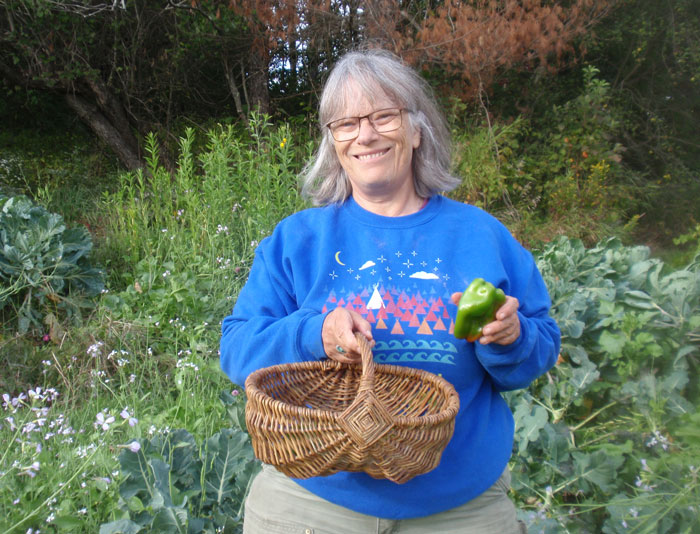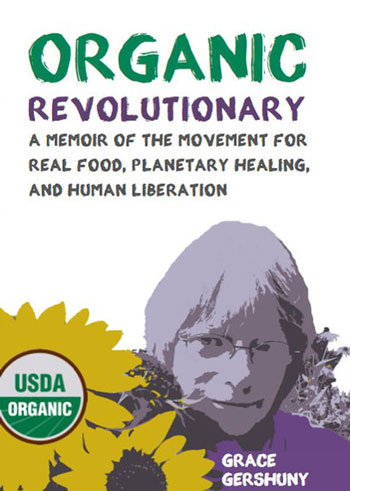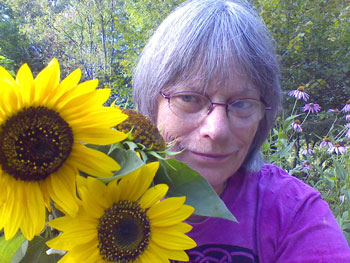| Organic Revolutionary Grace Gershuny Champions Real Food | |||||
| by Sarah Galbraith | |||||
Grace Gershuny photo: Pete Blose |
|||||
It’s hard to imagine a time when organic was a fringe concept and farmers’ markets were unwelcome in town centers in Vermont. But that was the environment within which Grace Gershuny—author, educator, and organic consultant—began her work. Gershuny has played a key role in promoting organic farming and food at the state, regional, and national levels. In the 1990s, she served in the US Department of Agriculture’s National Organic Program. Gershuny is one of the architects of the rules and definitions behind the US Department of Agriculture’s organic label that we see on our food and fiber products today. This label certifies that the product was produced without certain harmful methods using only certain allowed substances and in a way that follows all USDA regulations and is overseen by a certified agent of the USDA National Organic Program. Prior to her role at USDA, Gershuny’s professional life was a long string of organizing roles in the grassroots organic movement, including coordinating conferences and educational events and developing an early organic certification program for the Northeast Organic Farming Association (NOFA). Doing business as GAIA Services, Gershuny now works as an independent organic inspector as well as consultant for private and nonprofit clients on all aspects of organic certification, developing related standards and certification systems and training programs. Gershuny’s book, Organic Revolutionary: A Memoir of the Movement for Real Food, Planetary Healing, and Human Liberation, self-published in 2016 with an updated version due out in 2017, is her story of hard-fought successes in food activism, set into the ups and downs of her own personal life. The time line from organic as a concept to a federal regulation is interwoven with marriages, divorces, farming, movement within and among social circles, death, and adopting and coparenting her daughter. Says Gershuny by phone from her home on a recent summer day, “I chose to make it a memoir because of my desire for people to understand what drove me to do what I did and what my thought process was, to humanize the process of government regulations.” These days, through her continued activism and education roles, whether it's writing, guest speaking, or teaching online classes at Green Mountain College, Gershuny frequently encounters critics of the organic label, or people who have a negative attitude about it. "People think it's been taken over by the USDA, or the Organic Trade Association is just a tool of the corporate world trying to corrupt the standard so businesses can take over," she says. Even among the well informed, she hears questions about corporate greenwashing, watering down, and a label that doesn't mean anything anymore.
“My gut response is that purity, which is about homogeneity, is anathema to the organic process. A good example is distilled water, which is totally pure, but lacking in the minerals that both make it taste good and replenish some of what is lost in perspiration and urine. Ecological harmony and ecosystem resilience demand high levels of diversity, which is the ultimate impurity. Diversity is crucial to health on many levels—genetic, species, cultural, aesthetic to name a few. And it is health rather than purity that is the ultimate objective of an organic system.” As she explains in several other places in the book, she adds, “the quest for purity has uncomfortable associations with the eco-fascist mindset.” She likens her dislike for the demand for purity in organic food to the type of purity advocated by racist segments of society, “like the Nazis who were the evil bogeypersons of my childhood,” she writes, continuing, “My feminist and sexual liberation impulses are similarly repulsed by the repression of women in the name of virginal purity, and beyond that, its connotations of whiteness (pure as the driven snow) and refinement.” Gershuny was a market gardener in the 1980s, when she and her then husband cultivated about two acres of his mother's land, located near St. Johnsbury. Eric and Mary Skovsted, a young, energetic couple, now own and work the property, called Joe's Brook Farm, which Gershuny says has become one of the bigger and better vegetable producers in the area. She has an easy walk to the barn the couple has converted into a farm stand. But despite the neighborly abundance, she still grows her own apples and vegetables and keeps chickens at her homestead. "I try to grow most of what I need," Grace said over the phone from her home on Joe's Brook, a tributary to the Passumpsic and then Connecticut Rivers. "I have been trying to cut back because I'm living next door to the best farm in the neighborhood. But I have a compulsion, and it really is important to me to grow some of the food I eat."
It’s the microbes. There’s been very strong correlations shown that people who are exposed to the soil from an earlier age have better immune systems and healthier gut flora. The gut is directly connected to the brain and well-being and all of that stuff. It’s not magic. Bureaucrats are human beings. People like to blame government for lots of things, and I’m no different, but they’re just human beings. I definitely learned at an early age that government bureaucracy—or any bureaucracy—is really not a good thing. But the people who are working within it are not necessarily to blame. When we talk about it as a labeling term, it means what the USDA says it means, right now. It means it was produced and processed and marketed and brought to wherever you’re buying it in a way that’s consistent with the regulations that the USDA enforces. The term [organic] doesn’t confer any particular qualities on the product—it’s about the process. It’s not something that you can determine in a lab. There has been some research that organic food has less pesticide residues on it, and it’s pretty obvious why that would be, but you can’t put the product in a lab and label it as organic or not because of “x-y” residue. But what it really is about is a positive method of producing food—and, increasingly, fiber—in a way that is going to improve the environment. When a consumer buys an organic product, they’re exercising what’s called the precautionary principle. There may not be hard and fast evidence that the product is safer than the conventional equivalent, or that the stuff on the conventional product is dangerous, although of course we know there’s been a lot of collusions between the regulators and agri-chemical companies to prevent really proper safety testing … It may not be better nutritionally, although there has been some work indicating that there’s higher nutrient density and more omega-3s in some organic products. But you know that it was grown in a way that is respectful of the environment, that doesn’t pollute, that requires the producer to maintain soil and water quality … you do know there is an alternative to using all these bad things that you know are hurting the environment, people’s health, and livestock health. That’s the precautionary principle: when you have a better option, you can use that instead. I go into a lot of tirades in the book about the dangers of purity. It’s really at the heart of the message in my book, the change of paradigm that we’re going through. Organic has been the leading edge, and it’s not a perfect idea, and it’s also given birth to a lot of these other “beyond organic” ideas. But, before you go beyond organic, you have to be organic. The role of consumers is really to educate themselves—that’s their task and mandate. That little white label is a call to learn more: Learn how food is produced in general and learn why [organic] is different. I really hate identifying people as consumers. I think that the best thing that any informed citizen can do is to become a producer, to whatever extent possible. A better term than consumer—how about human being? We’re all citizens and have rights as citizens, and one of those rights is to know where our food comes from. Grow your own. Learn, educate yourself. Join with other concerned citizens to help advance a policy agenda and support your local farmer without getting crazy about it. When buying food, buy whole food, things you can process yourself. When you’re able to get some surplus from the farmers’ market, can, freeze, pickle, or ferment it. Fermentation is one of those old-fashioned things coming back in a big way. Learn about food processing, and do some more food processing at home. I consider myself to be part of the consciousness of the earth trying to save itself. That’s part of why working in the garden is something that’s important to me. That’s why my business name is GAIA Services, I’m really here to serve Gaia. My conscious dedication of my life to the life of the planet, that’s what sees me through. That’s the guiding star. Don’t be so hard on yourself. You can aim high, but when you don’t make it, don’t beat yourself up for it. That kind of self-care really leads you to be a nicer person to other people too. Activists in general, because they’re so demanding of themselves, come off as hypercritical of other people, who they might rightfully be critical of. But dealing on a one-to-one basis, it doesn’t convince anyone that you’re right if you tell them “you’re a lousy so-and-so and killing the earth.” We’re really all in this together, and that’s part of the dilemma because there’s a lot of us that don’t really understand that. It’s kind of the terrible quality of our particular culture to see things in black-and-white—it’s us or them. And that’s been the case for a while now. The news this morning [Trump threatened “fire and fury” to North Korea the day before] is about as scary as it gets … if we don’t kill them they’re going to kill us. That’s a horrifying thing. I like my bumper sticker: “There’s no hope, but maybe I’m wrong.” I’m really scared a lot, and the only thing I know to do is just keep trying. Giving up isn’t an option. There’s a lot of great work being done by black land reclamation [reclaiming land ownership and food sovereignty for African Americans]. I was just in New York a couple of weeks ago with these folks who organized a black land care coalition, diaspora land collation. More and more young people are realizing that they have to take back their land. I went to this great conference in Ithaca, Groundswell, an organization I’ve been following for a while, and it was mostly black led, and that’s really different in the organic movement. The organic movement has been way too white. There’s the food workers alliance [that] is advocating for food system workers who are the most exploited people in our country, and it has its roots in racism, and I talk about that in my epilogue and knowing those connections. Capitalism is really a bad system; it is on its way out. But it’s also a dangerously powerful system, so [we need to] be very careful how you dismantle it. There’s a lot of work to be done on all of those levels—it’s very important to educate yourself about how they all work and where the pressure points are. For more on the intersections among food, farming, race, politics, capitalism, and more, visit Grace Gershuny’s blog and sign up for her newsletter on her website at www.organic-revolutionary.com. Her book can be ordered from her website as well.
|
|||||
|
Sarah Galbraith is a writer covering outdoor sports, adventure, local food, and craft beer. Follow her on Twitter @adventurevt
|
||||


